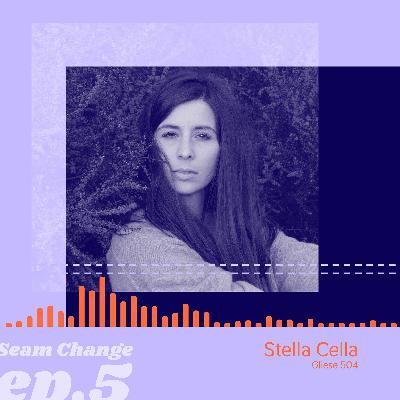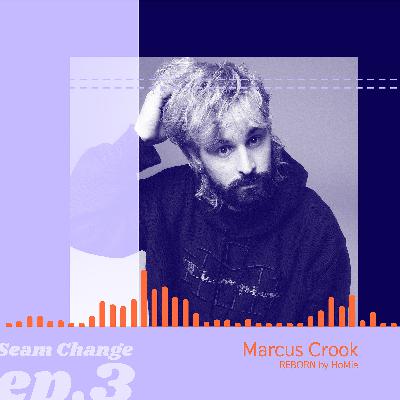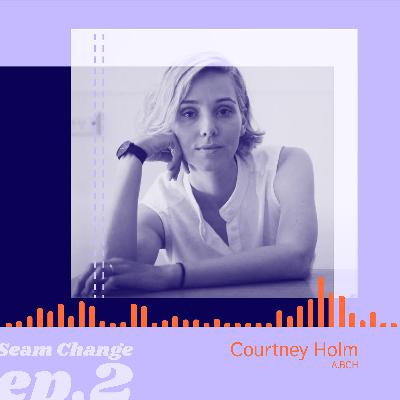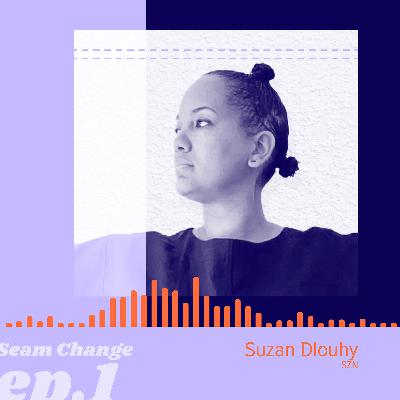Discover Seam Change
Seam Change

Seam Change
Author: Julia English
Subscribed: 2Played: 9Subscribe
Share
© Copyright 2022 All rights reserved.
Description
Have you ever wondered what happens to those clothes that get returned because of a faulty zip, or the ones that just never get sold in the first place? This type of textile waste is a common issue for brands big and small, but what are they doing with it? Turns out, some local Aussie fashion businesses are collaborating with other brands and designers to remake, resew, redye, remanufacture, or upcycle that ‘waste’ into something new. I want to find out how these collaborations occur; in fact, I’m doing a PhD on it, and I wanted to bring you along for the ride. So, join me, Julia English, on Seam Change, a podcast where I interview these creatives and ask them all my burning questions, from how they met each other, the steps involved in these types of partnerships as well as how it contributes to their business overall.
7 Episodes
Reverse
Bethany Jakob is the designer behind Bethany Alice Fashion Design, and in this episode we are chatting about her collaboration with Lois Hazel. Having trained in fashion design at RMIT and after working in bridal for a few years, Bethany was shocked by how women expected their bodies to fit their clothes, not the other way around. She started offering alterations to friends and family around 6 years ago to help them feel confident in their wardrobe and her business grew from there. She now travels around Victoria meeting with clients and offering alterations packages to transform their wardrobes. As well as alterations, she creates upcycled styles to help inspire her clients to see the potential for their unworn clothes. After connecting with Lois Hazel, a local Melbourne brand, the two worked together to transform Lois’s unsold stock through adding panels to create voluminous sleeves and adjusting the design to enable reversibility.
We start by talking about her journey into doing alterations, and the early stages of her work with Lois, from the first meeting, to how they worked together to design the project. Next Bethany dives into the nitty gritty around the materials and processes involved, as well as how she structured the financial side. We then talk about trust and what makes people attractive to work with before wrapping up with what drives her to keep going, from both a big picture perspective and her daily motivations.
About the Research:
This podcast is part of my (Julia English’s) PhD research at RMIT University. Please note, engagement with this podcast (for example, reviews) will be included in the research. If you wish your engagement to be excluded, please email me (Julia.english@student.rmit.edu.au). Your engagement helps me understand whether sharing interviews in this way is helpful and assists my research in identifying if this knowledge is of value to the local industry. You can find more information on my Instagram including an FAQ section, as I am also using feedback through my social media channels.
My research is looking into how people like Bethany are working together to do these types of projects, where waste is being remade into new things. The way that I am finding out more about these types of projects is through interviews, and that is what you are listening to on the podcast. As noted in the recording, these are edited to create a smooth sounding podcast and some parts of the interview may have been excluded if not suitable for public sharing, or if the interview was overly long.
This research project has had ethics approval through RMIT University (2021-24506-15223).
Links & Contact Info:
For Bethany’s website: https://www.bethanyalice.com.au/
Instagram: bethanyalice_fashiondesign
Keen to connect with me?
Instagram: _julia.english_
Email: Julia.english@student.rmit.edu.au
Credits:
Music by Frank Henry, with thanks.
This PhD research is funded by an Australian Research Training Program Scholarship.
Transcripts & Citation:
For access to both pdf and text files of transcripts, head over here: https://doi.org/10.25439/rmt.19380890
Please cite as:
English, Julia (2022): Bethany Jakob from Bethany Alice Fashion Design on the joys of alterations and collaborating with Lois Hazel | Episode 6 | Seam Change Podcast. RMIT University. Media. https://doi.org/10.25439/rmt.19380890
Stella Cella is the lead designer behind upcycling brand Gliese 504. Grown out of a desire to do things differently, the brand focuses on upcycling and renewing materials and garments that could otherwise be wasted, through modification and dyeing, as well as creating accessories from smaller scraps. Stella started the brand in 2017, initially experimenting with using preloved clothes and transforming them into new styles, which lead into an Etsy store and selling second hand pieces alongside their upcycled designs. After creating a range using men’s business shirts in 2019, Stella connected with Nique, whom she partnered with to design a small range of remade styles from their unsold or damaged stock. This became an ongoing relationship, and she still works with them in various capacities today.
Listen along to hear how her experiences in retail drove Stella to start doing this work, as well as how she first met Nique. She then shares more about this relationship, and how it evolved and progressed, as well as some insights into the financial side of her business. Finally, we talk about her studio set up and what success means to her and concludes with Stella’s key advice for others working in this space.
About the Research:
This podcast is part of my (Julia English’s) PhD research at RMIT University. Please note, engagement with this podcast (for example, reviews) will be included in the research. If you wish your engagement to be excluded, please email me (Julia.english@student.rmit.edu.au). Your engagement helps me understand whether sharing interviews in this way is helpful and assists my research in identifying if this knowledge is of value to the local industry. You can find more information on my Instagram including an FAQ section, as I am also using feedback through my social media channels.
My research is looking into how people like Stella are working together to do these types of projects, where waste is being remade into new things. The way that I am finding out more about these types of projects is through interviews, and that is what you are listening to on the podcast. As noted in the recording, these are edited to create a smooth sounding podcast and some parts of the interview may have been excluded if not suitable for public sharing, or if the interview was overly long.
This research project has had ethics approval through RMIT University (2021-24506-15223).
Links & Contact Info:
To shop Gliese 504: https://gliese504.myshopify.com/
Renique Renew Initiative: https://www.nique.com.au/pages/re-nique-renew
Keen to connect with me?
Instagram: _julia.english_
Email: Julia.english@student.rmit.edu.au
Credits:
Music by Frank Henry, with thanks.
This PhD research is funded by an Australian Research Training Program Scholarship.
Transcripts & Citation:
For access to both pdf and text files of transcripts, head over here: https://doi.org/10.25439/rmt.19361003
Please cite as:
English, Julia (2022): Gliese 504’s designer Stella Cella on her work with Nique, and how it’s evolved from a Facebook comment to tie dyeing their stock | Episode 5 | Seam Change Podcast. RMIT University. Media. https://doi.org/10.25439/rmt.19361003
Luke Phillips is the designer behind modular bag brand Into Carry. Trained in industrial design, Luke started the brand in 2019, after tinkering around with bag designing for years, and it’s now grown to become his full-time job. Born out of a design to find a solution for waste, the bags have a recycled base material which gives them structural integrity. This is the canvas for a whole variety of textiles and waste streams, from Nursery Planter bags which make their green and black core designs, to limited ranges using denim and tartan storage bags from Upparel, to pieced offcuts in collaboration with REBORN by HoMie. Designed as a flat panel, the bags are snapped into shape with industrial press studs, meaning they can be opened up for cleaning when needed. All of their bag designs are modular, designed to interlock and fit with each other, so that you can mix it up to meet the needs for each day.
Listen in as we start by covering their work with Upparel, from the initial meeting and early discussions. Then we dive further into the details, talking about design development and finances, and how Luke has had those discussions with collaborators. We also talk about their work with REBORN by HoMie and what happens to the waste that Into Carry themselves produce. Finally, we talk values and what they get out of the collaboration, as well as where Luke sees the brand going in the future.
About the Research:
This podcast is part of my (Julia English’s) PhD research at RMIT University. Please note, engagement with this podcast (for example, reviews) will be included in the research. If you wish your engagement to be excluded, please email me (Julia.english@student.rmit.edu.au). Your engagement helps me understand whether sharing interviews in this way is helpful and assists my research in identifying if this knowledge is of value to the local industry. You can find more information on my Instagram including an FAQ section, as I am also using feedback through my social media channels.
My research is looking into how people like Luke are working together to do these types of projects, where waste is being remade into new things. The way that I am finding out more about these types of projects is through interviews, and that is what you are listening to on the podcast. As noted in the recording, these are edited to create a smooth sounding podcast and some parts of the interview may have been excluded if not suitable for public sharing, or if the interview was overly long.
This research project has had ethics approval through RMIT University (2021-24506-15223).
Links & Contact Info:
For more on Into Carry: https://intocarry.co/
Project Blank: https://projectblank.com.au/pages/intocarry
Megara: https://megara.com.au/
Upparel Bags: https://upparel.com.au/product/into-carry-bag/
REBORN by HoMie: https://homie.com.au/collections/reborn
Keen to connect with me?
Instagram: _julia.english_
Email: Julia.english@student.rmit.edu.au
Credits:
Music by Frank Henry, with thanks.
This PhD research is funded by an Australian Research Training Program Scholarship.
Transcripts & Citation:
For access to both pdf and text files of transcripts, head over here:
https://doi.org/10.25439/rmt.19322270
Please cite as:
English, Julia (2022): Luke Phillips from Into Carry on material collaborations for their modular bag designs | Episode 4 | Seam Change Podcast. RMIT University. Media. https://doi.org/10.25439/rmt.19322270
Marcus Crook is the co-founder HoMie, which stands for Homelessness of Melbourne Incorporated Enterprise, a not for profit which supports young people affected by homelessness or hardship. He’s also the creative director of their offshoot brand REBORN, which remakes damaged and unsold stock into new designs, which is what we’ll be focusing on in today’s episode. REBORN by HoMie was launched at Melbourne Fashion Festival in 2020, with their first collaboration with Champion following soon after. They use returns and damaged stock, which they cut, sewed and printed into new pieces. They source these materials from both the HoMie brand as well as other partners such as Nobody Denim, Upparel, Into Carry, and Champion. REBORN has also recently taken home some awards in acknowledgement of the work they do, including as a finalist for the Victorian Premier Design Award in 2020, and received a gold at the Australian Good Design Awards 2021.
This episode kicks off with how it all began, when REBORN organically grew out having a play with some leftover stock. We talk about how their existing networks and partners supported them through various collaborations, and the steps involved. Next, we talk more about the negotiation side, discussing their collaboration with Into Carry and what makes them love working with someone. Marcus also shares more about the partnership dynamics and breaks down how this can be split with both finances and responsibility. Finally, we talk Covid, challenges and grants, and how these have intersected with the brand, with Marcus wrapping up with his advice for others looking to work in this way.
About the Research:
This podcast is part of my (Julia English’s) PhD research at RMIT University. Please note, engagement with this podcast (for example, reviews) will be included in the research. If you wish your engagement to be excluded, please email me (Julia.english@student.rmit.edu.au). Your engagement helps me understand whether sharing interviews in this way is helpful and assists my research in identifying if this knowledge is of value to the local industry. You can find more information on my Instagram including an FAQ section, as I am also using feedback through my social media channels.
My research is looking into how people like Marcus are working together to do these types of projects, where waste is being remade into new things. The way that I am finding out more about these types of projects is through interviews, and that is what you are listening to on the podcast. As noted in the recording, these are edited to create a smooth sounding podcast and some parts of the interview may have been excluded if not suitable for public sharing, or if the interview was overly long.
This research project has had ethics approval through RMIT University (2021-24506-15223).
Links & Contact Info:
For more on HoMie: https://homie.com.au/
For REBORN: https://homie.com.au/pages/rebornbyhomie
Keen to connect with me?
Instagram: _julia.english_
Email: julia.english@student.rmit.edu.au
Credits:
Music by Frank Henry, with thanks.
This PhD research is funded by an Australian Research Training Program Scholarship.
Transcripts & Citation:
For access to both pdf and text files of transcripts, head over here: https://doi.org/10.25439/rmt.19172570
Please cite as:
English, Julia (2022): Marcus Crook, co-founder of HoMie, on creating upcycled brand REBORN and building partnerships | Episode 3 | Seam Change Podcast. RMIT University. Media. https://doi.org/10.25439/rmt.19172570
Courtney Holm is the designer behind the circular fashion brand A.BCH. The brand was founded in 2017 and focuses on offering transparency about all the processes involved in producing their circular pieces, as well as sharing advice on wardrobe care, and providing a repair service should their products break. With a minimalist aesthetic, A.BCH considers design from the ground up, starting with the raw materials, and having strict selection criteria to make sure they are having as minimal negative impact on the planet as possible. Alongside their main range, they also offer a selection of one offs and custom pieces, called A.BCH Red line, which often include more colourful pieces and interesting weaves. Two of these designs are the focus for today’s chat, as Courtney partnered with Tasmanian based Waverley Mills to remake some of their mis-woven blankets into beautiful coats.
First up, Courtney dives into the process and steps involved in designing the jackets, and how all the components were carefully considered. Then we talk about her passion for understanding all parts of the supply chain, which led to her finding this waste source. Finally, she shares a bit about how the creative and business sides of the business intermingle, and what types of collaboration she’s exploring now.
About the Research:
This podcast is part of my (Julia English’s) PhD research at RMIT University. Please note, engagement with this podcast (for example, reviews) will be included in the research. If you wish your engagement to be excluded, please email me (Julia.english@student.rmit.edu.au). Your engagement helps me understand whether sharing interviews in this way is helpful and assists my research in identifying if this knowledge is of value to the local industry. You can find more information on my Instagram including an FAQ section, as I am also using feedback through my social media channels.
My research is looking into how people like Courtney are working together to do these types of projects, where waste is being remade into new things. The way that I am finding out more about these types of projects is through interviews, and that is what you are listening to on the podcast. As noted in the recording, these are edited to create a smooth sounding podcast and some parts of the interview may have been excluded if not suitable for public sharing, or if the interview was overly long.
This research project has had ethics approval through RMIT University (2021-24506-15223).
Links & Contact Info:
For more on A.BCH: abch.world
Keen to connect with me?
Instagram: _julia.english_
Email: Julia.english@student.rmit.edu.au
Credits:
Music by Frank Henry, with thanks.
This PhD research is funded by an Australian Research Training Program Scholarship.
Transcripts & Citation:
For access to both pdf and text files of transcripts, head over here: https://doi.org/10.25439/rmt.18739151
Please cite as:
English, Julia (2022): Courtney Holm from A.BCH on partnering with Waverley Mills for her Red Line coats | Episode 2 | Seam Change Podcast. RMIT University. Media. https://doi.org/10.25439/rmt.18739151
Suzan Dlouhy is the designer behind Melbourne based fashion brand SZN, which offer custom and one-off designs using unwanted materials. This episode focuses on her collaboration with Nique, another Aussie brand, for their ReNique Renew initiative where she pieced together their textile waste into a limited run of oversized patchworked linen dresses. This project is only one part of Suzan’s work with her brand SZN, which she started in 2012. Using textile waste has always been a key part of her design approach, which has evolved into her signature mismatched pieced fabric aesthetic which she showcases through loose and comfortable styles. Like many creatives, she juggles her brand with a few other jobs, including teaching at Second Stitch, a social enterprise which offers fashion production training for migrants, refugees, and asylum seekers, and she also works as a DJ.
Suzan starts by painting a picture of the garments that she created for Nique and discussing the various factors which shaped her design approach. We then dive into the making process, talking about creative spaces and how running a small business intersects with daily life. She also shares some thoughts about pricing as a creative, and how she tackles this in practice. Finally, we dive into what being small really looks like, and how her strategies have shifted over the brand’s 10 years, as well as the advice she’d give to others who want to follow in her footsteps.
About the Research:
This podcast is part of my (Julia English’s) PhD research at RMIT University. Please note, engagement with this podcast (for example, reviews) will be included in the research. If you wish your engagement to be excluded, please email me (Julia.english@student.rmit.edu.au). Your engagement helps me understand whether sharing interviews in this way is helpful and assists my research in identifying if this knowledge is of value to the local industry. You can find more information on my Instagram including an FAQ section, as I am also using feedback through my social media channels.
My research is looking into how people like Suzan are working together to do these types of projects, where waste is being remade into new things. The way that I am finding out more about these types of projects is through interviews, and that is what you are listening to on the podcast. As noted in the recording, these are edited to create a smooth sounding podcast and some parts of the interview may have been excluded if not suitable for public sharing, or if the interview was overly long.
This research project has had ethics approval through RMIT University (2021-24506-15223).
Links & Contact Info:
For more on SZN: https://szn.com.au/
Renique Renew Initiative: https://www.nique.com.au/pages/re-nique-renew
Keen to connect with me?
Instagram: _julia.english_
Email: Julia.english@student.rmit.edu.au
Credits:
Music by Frank Henry, with thanks.
This PhD research is funded by an Australian Research Training Program Scholarship.
Transcripts & Citation:
For access to both pdf and text files of transcripts, head over here: https://doi.org/10.25439/rmt.19241943
Please cite as:
English, Julia (2022): Suzan Dlouhy from SZN on being part of the ReNique Renew initiative and staying small | Episode 1 | Seam Change Podcast. RMIT University. Media. https://doi.org/10.25439/rmt.19241943
What are we actually doing with our textile waste?
Let's ask the people who are finding solutions for it.
I'm doing a PhD exploring how Australian fashion creatives are collaborating to upcycle or reuse each other's waste. To do this, I'm conducting interviews, and instead of hiding them away, I'm sharing them with you through a podcast.
Music by Frank Henry
About the Research:
This podcast is part of my (Julia English’s) PhD research at RMIT University. Please note, engagement with this podcast (for example, reviews) will be included in the research. If you wish your identifiable engagement to be excluded, please email me (Julia.english@student.rmit.edu.au). Your engagement helps me understand whether sharing interviews in this way is helpful and assists my research in identifying if this knowledge is of value to the local industry. You can find more information on my Instagram (_julia.english_) including an FAQ section, as I am also using feedback through my social media channels.
This research project has had ethics approval through RMIT University (2021-24506-15223).
Transcript:
Ever wondered what happens to those clothes that get returned because of a faulty zip, or the ones that just never get sold in the first place? This type of textile waste is a common issue for brands big and small, but what are they doing with it? Turns out, some local Aussie businesses are collaborating with other brands and designers to remake that ‘waste’ into something new. I want to find out how these collaborations occur, in fact I’m doing a PhD on it and I wanted to bring you along for the ride. So, join me, Julia English on Seam Change, a podcast where I interview these creatives and ask them all my burning questions, from how they met each other, the steps involved in these types of partnerships and all the juicy details. You can catch the first episode on March 7, wherever you get your podcasts.









